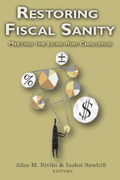ABSTRACT
The build up in government debt in response to the ‘great recession’ has raised a number of policy dilemmas for individual countries as well as the world as a whole. Where the government fiscal stimulus was seen as necessary to restore confidence to markets and stimulate deteriorating economies in the aftermath of the ‘great recession’ by 2010 the massive fiscal stimulus programs and associated run-up in debt had, for many economies, become a confidence sapping exercise. This need for a change of fiscal policy stance has fuelled another debate that has two related aspects. One is the impact of fiscal consolidation on economies that are tightening and the flow-on effects to the world economy. The other debate is how much tightening there should be and how quickly.
This paper explores these issues in a global framework focussing on the national and global consequences of coordinated fiscal consolidation. It explores the implications this fiscal adjustment might have on country risk premia and what happens if all countries coordinate their fiscal adjustment except the United States. A coordinated fiscal consolidation in the industrial world that is not accompanied by U.S. actions is likely to lead to a substantial worsening of trade imbalances globally as the release of capital in fiscally contracting economies flows into the U.S. economy, appreciates the U.S. dollar and worsens the current position of the U.S. The scale of this change is likely to be sufficient to substantially increase the probability of a trade war between the United States and other economies. In order to avoid this outcome, a coordinated fiscal adjustment is clearly in the interest of the global economy.
The Brookings Institution is committed to quality, independence, and impact.
We are supported by a diverse array of funders. In line with our values and policies, each Brookings publication represents the sole views of its author(s).









